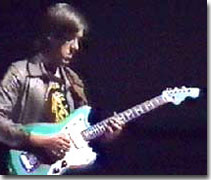Alex Szalay
“All my life, I've liked to take long shots,” said Alex Szalay, a former rock star who studies astronomy at Johns Hopkins University. “I'm not afraid of investing a few years' effort into something if it has a chance of paying off. And interestingly enough, most of my long shots have paid off in the end. So I would like to encourage people… to choose the high-risk [options]. It's much more fun.”
Szalay has recently seen one of his highest-risk projects begin to pay off. He spent nine years working on the Sloan Digital Sky Survey, a project that promises to revolutionize astronomy. The Sloan, as scientists call it, began collecting data last October. It can take images of almost 1,000,000 galaxies a night; by the time it is completed in 2005, it will be the most richly detailed survey of the night sky ever taken.

Alex Szalay rocking out
The Sloan will also make its images and data available on the Internet for scientists to download. Instead of signing up for time on a telescope to conduct their research, astronomers will be able to log on to the Sloan's web site and download the images they need. Rather than waiting years to collect the data they need for their research, astronomers will get images and data in minutes. Because astronomers can get instant access to data, they will be able to finish their work much more quickly. “The world of astronomy will be before Sloan and after Sloan,” said Szalay. “It's very rare that one can participate in the changing of a field.”
Szalay has been involved in physics and astronomy since childhood. He grew up in Hungary, where both his parents were physicists. His father founded the first nuclear physics lab in Hungary; when Szalay was a child, his family's apartment was always full of physics equipment. “My parents never pushed me to be a physicist,” he said. “But it seemed like an incredibly cool thing to do.” At the time, the Communist Party ruled Hungary, and Szalay said physics was one of few fields where someone could succeed without agreeing with all the Party's policies. Szalay went to college and graduate school at Eötvös University in Hungary. After grad school, he studied with the famous Soviet physicist Yakov Zeldovich.
At age 15, Szalay saw the Beatles play in Stockholm, Sweden as part of a world tour. That summer, he won some prize money from a Hungary-wide high school math contest. “Much to my parents' disappointment,” he said, “I spent it on an electric guitar.” Szalay taught himself to play, and he has played ever since. In college, he and his brother formed a rock band; Szalay played guitar, his brother played bass, and three college friends joined in on keyboard, drums and vocals. The band, which they named Panta Rhei, played jazz, progressive rock, and rock adaptations of classical music. The band recorded two LPs and six singles in Hungarian and English, and went on tour around Eastern Europe.
Szalay sees parallels between the music he wrote and performed for Panta Rhei and the galaxies he studies as an astronomer. “Writing a [scientific research] paper is very much like writing a song,” he said. “Sometimes looking at a formula is just as aesthetically pleasing as hearing a nice riff… you get the shivers because you think, 'I may have touched on something that no one else has ever noticed before.'”











